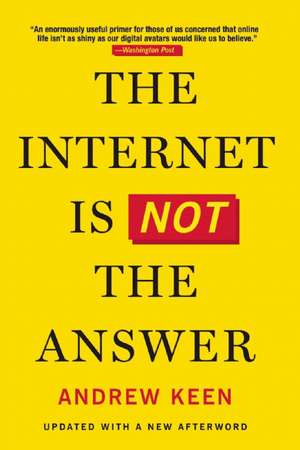The Internet Is Not the Answer
Autor Andrew Keenen Limba Engleză Paperback – 11 ian 2016
Since its creation during the Cold War, the Internet, together with the Web, personal computers, tablets and smartphones, has ushered in one of the greatest shifts in society since the Industrial Revolution. The Digital Revolution has contributed to the world in many positive ways, but we are less aware of the Internet’s deeply negative effects.
The Internet Is Not the Answer, by longtime Internet skeptic Andrew Keen, offers a comprehensive look at what the Internet is doing to our lives. The book traces the technological and economic history of the Internet, from its founding in the 1960s through the rise of big data companies to the increasing attempts to monetize almost every human activity. In this sharp, witty narrative, informed by the work of other writers, reporters, and academics, as well as his own research and interviews, Keen shows us the tech world, warts and all.
Startling and important, The Internet Is Not the Answer is a big-picture look at what the Internet is doing to our society and an investigation of what we can do to try to make sure the decisions we are making about the reconfiguring of our world do not lead to unpleasant, unforeseen aftershocks.
The Internet Is Not the Answer, by longtime Internet skeptic Andrew Keen, offers a comprehensive look at what the Internet is doing to our lives. The book traces the technological and economic history of the Internet, from its founding in the 1960s through the rise of big data companies to the increasing attempts to monetize almost every human activity. In this sharp, witty narrative, informed by the work of other writers, reporters, and academics, as well as his own research and interviews, Keen shows us the tech world, warts and all.
Startling and important, The Internet Is Not the Answer is a big-picture look at what the Internet is doing to our society and an investigation of what we can do to try to make sure the decisions we are making about the reconfiguring of our world do not lead to unpleasant, unforeseen aftershocks.
Preț: 55.08 lei
Preț vechi: 68.86 lei
-20% Nou
Puncte Express: 83
Preț estimativ în valută:
10.54€ • 10.96$ • 8.70£
10.54€ • 10.96$ • 8.70£
Carte indisponibilă temporar
Doresc să fiu notificat când acest titlu va fi disponibil:
Se trimite...
Preluare comenzi: 021 569.72.76
Specificații
ISBN-13: 9780802124616
ISBN-10: 0802124615
Pagini: 288
Dimensiuni: 137 x 208 x 23 mm
Greutate: 0.3 kg
Ediția:First Trade Paper Edition
Editura: Grove Atlantic
ISBN-10: 0802124615
Pagini: 288
Dimensiuni: 137 x 208 x 23 mm
Greutate: 0.3 kg
Ediția:First Trade Paper Edition
Editura: Grove Atlantic
Recenzii
Praise for The Internet Is Not the Answer:
“The Internet Is Not the Answer is the most compelling, persuasive, and passionately negative thing I’ve yet read on this topic. It offers a scary picture of how the ultra-libertarian superstars of Silicon Valley are leading us inexorably into a future with the sort of social inequalities not seen in the West since the early days of the Industrial Revolution.”—Kazuo Ishiguro, New Statesman (Books of the Year)
“Andrew Keen has written a very powerful and daring manifesto questioning whether the Internet lives up to its own espoused values. He is not an opponent of Internet culture, he is its conscience, and must be heard.”—Po Bronson
“Andrew Keen is the Christopher Hitchens of the Internet. Neglect this book with peril. In an industry and world full of prosaic pabulum about the supposedly digitally divine, Keen’s work is an important and sharp razor.”—Michael Fertik, CEO, Reputation.com
“This is the best and most readable critique of Silicon Valley yet. Keen is no technophobe nor a stranger to The Valley and this is what makes his book especially devastating. On the other hand it allows him to carve out a small space for optimism.”—David Lowery, founder of Camper Van Beethoven and cofounder of Cracker
“Keen is intent on exposing the greed, egotism and narcissism that fuels the tech world . . . Even if you don't agree with, say, his vitriolic takedowns of Uber and Airbnb, his sheer passion is likely to hold your interest.”—Chicago Tribune
“The Internet Is Not the Answer claims that the only real best friend today’s tech titans have is money, and until policymakers intervene, or until the ‘digital elite’ adopt a more altruistic posture, the Internet will remain a winner-take-all marketplace that’s widening a yawning gulf between society’s haves and have-nots. . . . The Internet Is Not the Answer supports its convincing narrative with startling numbers and research cataloged over roughly forty pages worth of endnotes.”—San Francisco Chronicle
“The Internet Is Not the Answer returns to arguments that Mr. Keen has made in previous books, expanding the case for worries about privacy in the wake of the revelations of Edward Snowden . . . it makes a strident economic argument. . . . Unbridled techno-Utopianism shows only the revolution’s benefits, and is dangerously incomplete. It is handy, therefore, to have sceptics like Mr. Keen around.”—Economist
“[Keen] can be a telling polemicist and has a sharp eye when it comes to skewering the pretensions and self-delusions of the new digital establishment. . . . Keen has a sharp ear for the sanctimonious of tech happy talk.” —Financial Times
“[Keen is] the most famous British tech voice in the US.”—GQ
“Keen’s larger point stands: The tech world, like industrial capitalism before it, will not become sufficiently equitable unless we legislate it to be that way . . . So instead of waiting for technology to sort us out, Keen argues that it’s time to intervene—to manage digital developments in ways that increase rather than undermine human welfare.”—Globe and Mail
“The Internet Is Not the Answer is the most frightening book I’ve read in years (perhaps in my lifetime), as frightful as the conservative Supreme Court justices and the deniers of climate change. . . . Keen is unsparing of what he calls ‘the libertarian elites’ who want to eliminate all oversight, all regulations, all concern for the safety of others. . . . I’d call him a prophet.”—CounterPunch
“Silicon Valley entrepreneur Andrew Keen takes on the very institution that provides his living . . . Impassioned and insistent, this is a wake-up call worth considering.”—Cleveland Plain Dealer
“Andrew Keen has again shown himself one of the sharpest critics of Silicon Valley hype, greed, egotism, and inequity. His tales are revealing, his analyses biting. Beneath the criticism is a moral commitment, too, a defense of humane society—the right to be left alone, a fair shot at success, access to the doings of the powerful, and other democratic ideals threatened by the Internet and its moguls.”—Mark Bauerlein, author of The Dumbest Generation
“Keen provokes us in every sense of the word—at times maddening, more often thought-provoking, he lets just enough out of the Silicon Valley hot air balloon to start a real conversation about the full impact of digital technology. But will anyone accept the invitation? And, if they do, will anyone thank Andrew Keen for bursting our bubble? If so, maybe there’s hope for the digital generation after all.”—Larry Downes, co-author of Unleashing the Killer App
“A provocative title and an even more provocative book. Andrew Keen rightly challenges us to think about how the internet will shape society. I remain more optimistic, but hope I’m right to be so.”—Mark Read, CEO, WPP Digital
“Andrew Keen has done it again. With great authority he places modern Silicon Valley into a historical context, comparing its structure to the feudal system, which produced a wealthy elite from the efforts of myriad serfs. If you have read The Circle, this is your next read. Like me, you may find much to disagree with. But you won’t be able to put it down. This is a book that demands a reaction. The Valley will never be the same.”—Keith Teare, co-founder of TechCrunch, Easynet and RealNames
“Keen makes a deeply important argument and offers a constructive caution that there is no Moore’s Law for human progress, that technological determinism is not a good in itself, and that until we fuse technology with humanity the real power in the technology that connects will in many ways be to disconnect us from what matters.”—Dov Seidman, CEO of LRN and author of How
"For the past two decades, as we listened to a chorus of pundits tell us the Internet would generate more democracy and opportunity, the real world seems to grow more oppressive and unequal by the day. Drawing on his formidable knowledge of this New Economy, Andrew Keen explains why Uber could make billions destroying taxi unions, to cite just one example - and why some people still see this as progress. If you've ever wondered why the New Economy looks suspiciously like the Old Economy—only with even more for the winners and less for everyone else—put down your shiny new phablet and read this book."—Robert Levine, author of Free Ride
“The argument travels between a beach in Mexico where the photo-sharing app Instagram was invented on a laptop and the boarded-up buildings in Rochester, N.Y., that memorialize the bankruptcy of Kodak. . . . [Keen] knows the digital world inside and out—both as an entrepreneur and as a journalistic commentator.”—Christian Science Monitor
“Keen goes among the Silicon Valley hipsters—those who truly believe they are on the verge of joining the one percent who own half the winner-takes-all economy—and he is not impressed.”—New Scientist
“Keen, himself a veteran of the tech industry, reveals the behind-the-scenes workings of the Internet . . . His best message, however, is that with consideration and the application of care we can still shape a future society that utilizes the strengths of the internet while not allowing it to overwhelm us and turn us into robotic servants of the very technology that was designed to help us gain freedom and growth as human beings.” —The Daily News Online
“If you’re stuck like a fly in the World Wide Web and your life is largely lived online, then The Internet Is Not the Answer is a book you won’t be able to put down.”—Journal Record
“Should be applauded for rowing against the tide of veneration for technological innovation.”—Daily Telegraph
“A punchy manifesto on the internet age. . . . [Keen] guides us through the history and excess of the net, from its arrival in 1991, though the birth of Instagram in 2010 and onwards, to the specter of privacy concerns and ‘big data’ that loom over us today. . . . The book is dazzling in scope. . . . This book is a must-read for anyone remotely concerned about their lives on the net.”—Independent
“Andrew Keen’s pleasingly incisive study argues that, far from being a democratizing force in society, the internet has only amplified global inequities. . . . [Keen] wants to persuade us to transcend our childlike fascination with the baubles of cyberspace so that we can take a long hard look at the weird, dysfunctional, inegalitarian, comprehensively surveilled world that we have been building with digital tools. . . . Keen challenges the dominant narrative about the internet—that it’s a technology that liberates, informs and empowers people.”—Guardian
“The most devastating book I’ve read in a long while. Keen describes an Internet that’s not as virtuous, open and egalitarian as was promised by those who developed it . . . this is from someone who embraces the digital age and still sees its potential.”—San Jose Mercury News
“Keen warns of [the] Internet’s disastrous impact . . . [he] argues that the digital revolution has been—his words—‘an epic fail.’ . . . A harsh critique of the digital world.”—Voice of America
“A devastating new book.”—Daily Mail
“Given the increasing power of technology in our lives, it’s worth spending some time with skeptics, people like Andrew Keen . . . The Internet Is Not the Answer is a polemic with a good dose of gratuitous tech bashing . . . Keen argues that the Internet’s hidden costs outweigh its benefits.”—Mercury News
“Keen wants you to know that the Internet has not lived up to its early promise. Rather than fostering an environment of intellectual and social democracy, it has spawned a rule-by-mob culture, promoted narcissism and voyeurism, encouraged intolerance and exclusivity, created global monopolies, increased unemployment, and decimated whole industries.”—Booklist
“A damning indictment of the Internet and digital technology . . . A well-written, convincing critique of Silicon Valley, and a worthy read for anyone with an email account.”—Publishers Weekly
“It is with an acerbic wit, perspective and profound dismay that Keen dismisses the Internet as the revolutionary vehicle for progressing human civilization that it started out to be.”—Prague Post
“[A] brilliant, packed history . . . An outstanding polemic, not only for internet sceptics (below as well as above the age of sixty) but also for its credulous users.”—Sydney Morning Herald
“The Internet Is Not the Answer is the most compelling, persuasive, and passionately negative thing I’ve yet read on this topic. It offers a scary picture of how the ultra-libertarian superstars of Silicon Valley are leading us inexorably into a future with the sort of social inequalities not seen in the West since the early days of the Industrial Revolution.”—Kazuo Ishiguro, New Statesman (Books of the Year)
“Andrew Keen has written a very powerful and daring manifesto questioning whether the Internet lives up to its own espoused values. He is not an opponent of Internet culture, he is its conscience, and must be heard.”—Po Bronson
“Andrew Keen is the Christopher Hitchens of the Internet. Neglect this book with peril. In an industry and world full of prosaic pabulum about the supposedly digitally divine, Keen’s work is an important and sharp razor.”—Michael Fertik, CEO, Reputation.com
“This is the best and most readable critique of Silicon Valley yet. Keen is no technophobe nor a stranger to The Valley and this is what makes his book especially devastating. On the other hand it allows him to carve out a small space for optimism.”—David Lowery, founder of Camper Van Beethoven and cofounder of Cracker
“Keen is intent on exposing the greed, egotism and narcissism that fuels the tech world . . . Even if you don't agree with, say, his vitriolic takedowns of Uber and Airbnb, his sheer passion is likely to hold your interest.”—Chicago Tribune
“The Internet Is Not the Answer claims that the only real best friend today’s tech titans have is money, and until policymakers intervene, or until the ‘digital elite’ adopt a more altruistic posture, the Internet will remain a winner-take-all marketplace that’s widening a yawning gulf between society’s haves and have-nots. . . . The Internet Is Not the Answer supports its convincing narrative with startling numbers and research cataloged over roughly forty pages worth of endnotes.”—San Francisco Chronicle
“The Internet Is Not the Answer returns to arguments that Mr. Keen has made in previous books, expanding the case for worries about privacy in the wake of the revelations of Edward Snowden . . . it makes a strident economic argument. . . . Unbridled techno-Utopianism shows only the revolution’s benefits, and is dangerously incomplete. It is handy, therefore, to have sceptics like Mr. Keen around.”—Economist
“[Keen] can be a telling polemicist and has a sharp eye when it comes to skewering the pretensions and self-delusions of the new digital establishment. . . . Keen has a sharp ear for the sanctimonious of tech happy talk.” —Financial Times
“[Keen is] the most famous British tech voice in the US.”—GQ
“Keen’s larger point stands: The tech world, like industrial capitalism before it, will not become sufficiently equitable unless we legislate it to be that way . . . So instead of waiting for technology to sort us out, Keen argues that it’s time to intervene—to manage digital developments in ways that increase rather than undermine human welfare.”—Globe and Mail
“The Internet Is Not the Answer is the most frightening book I’ve read in years (perhaps in my lifetime), as frightful as the conservative Supreme Court justices and the deniers of climate change. . . . Keen is unsparing of what he calls ‘the libertarian elites’ who want to eliminate all oversight, all regulations, all concern for the safety of others. . . . I’d call him a prophet.”—CounterPunch
“Silicon Valley entrepreneur Andrew Keen takes on the very institution that provides his living . . . Impassioned and insistent, this is a wake-up call worth considering.”—Cleveland Plain Dealer
“Andrew Keen has again shown himself one of the sharpest critics of Silicon Valley hype, greed, egotism, and inequity. His tales are revealing, his analyses biting. Beneath the criticism is a moral commitment, too, a defense of humane society—the right to be left alone, a fair shot at success, access to the doings of the powerful, and other democratic ideals threatened by the Internet and its moguls.”—Mark Bauerlein, author of The Dumbest Generation
“Keen provokes us in every sense of the word—at times maddening, more often thought-provoking, he lets just enough out of the Silicon Valley hot air balloon to start a real conversation about the full impact of digital technology. But will anyone accept the invitation? And, if they do, will anyone thank Andrew Keen for bursting our bubble? If so, maybe there’s hope for the digital generation after all.”—Larry Downes, co-author of Unleashing the Killer App
“A provocative title and an even more provocative book. Andrew Keen rightly challenges us to think about how the internet will shape society. I remain more optimistic, but hope I’m right to be so.”—Mark Read, CEO, WPP Digital
“Andrew Keen has done it again. With great authority he places modern Silicon Valley into a historical context, comparing its structure to the feudal system, which produced a wealthy elite from the efforts of myriad serfs. If you have read The Circle, this is your next read. Like me, you may find much to disagree with. But you won’t be able to put it down. This is a book that demands a reaction. The Valley will never be the same.”—Keith Teare, co-founder of TechCrunch, Easynet and RealNames
“Keen makes a deeply important argument and offers a constructive caution that there is no Moore’s Law for human progress, that technological determinism is not a good in itself, and that until we fuse technology with humanity the real power in the technology that connects will in many ways be to disconnect us from what matters.”—Dov Seidman, CEO of LRN and author of How
"For the past two decades, as we listened to a chorus of pundits tell us the Internet would generate more democracy and opportunity, the real world seems to grow more oppressive and unequal by the day. Drawing on his formidable knowledge of this New Economy, Andrew Keen explains why Uber could make billions destroying taxi unions, to cite just one example - and why some people still see this as progress. If you've ever wondered why the New Economy looks suspiciously like the Old Economy—only with even more for the winners and less for everyone else—put down your shiny new phablet and read this book."—Robert Levine, author of Free Ride
“The argument travels between a beach in Mexico where the photo-sharing app Instagram was invented on a laptop and the boarded-up buildings in Rochester, N.Y., that memorialize the bankruptcy of Kodak. . . . [Keen] knows the digital world inside and out—both as an entrepreneur and as a journalistic commentator.”—Christian Science Monitor
“Keen goes among the Silicon Valley hipsters—those who truly believe they are on the verge of joining the one percent who own half the winner-takes-all economy—and he is not impressed.”—New Scientist
“Keen, himself a veteran of the tech industry, reveals the behind-the-scenes workings of the Internet . . . His best message, however, is that with consideration and the application of care we can still shape a future society that utilizes the strengths of the internet while not allowing it to overwhelm us and turn us into robotic servants of the very technology that was designed to help us gain freedom and growth as human beings.” —The Daily News Online
“If you’re stuck like a fly in the World Wide Web and your life is largely lived online, then The Internet Is Not the Answer is a book you won’t be able to put down.”—Journal Record
“Should be applauded for rowing against the tide of veneration for technological innovation.”—Daily Telegraph
“A punchy manifesto on the internet age. . . . [Keen] guides us through the history and excess of the net, from its arrival in 1991, though the birth of Instagram in 2010 and onwards, to the specter of privacy concerns and ‘big data’ that loom over us today. . . . The book is dazzling in scope. . . . This book is a must-read for anyone remotely concerned about their lives on the net.”—Independent
“Andrew Keen’s pleasingly incisive study argues that, far from being a democratizing force in society, the internet has only amplified global inequities. . . . [Keen] wants to persuade us to transcend our childlike fascination with the baubles of cyberspace so that we can take a long hard look at the weird, dysfunctional, inegalitarian, comprehensively surveilled world that we have been building with digital tools. . . . Keen challenges the dominant narrative about the internet—that it’s a technology that liberates, informs and empowers people.”—Guardian
“The most devastating book I’ve read in a long while. Keen describes an Internet that’s not as virtuous, open and egalitarian as was promised by those who developed it . . . this is from someone who embraces the digital age and still sees its potential.”—San Jose Mercury News
“Keen warns of [the] Internet’s disastrous impact . . . [he] argues that the digital revolution has been—his words—‘an epic fail.’ . . . A harsh critique of the digital world.”—Voice of America
“A devastating new book.”—Daily Mail
“Given the increasing power of technology in our lives, it’s worth spending some time with skeptics, people like Andrew Keen . . . The Internet Is Not the Answer is a polemic with a good dose of gratuitous tech bashing . . . Keen argues that the Internet’s hidden costs outweigh its benefits.”—Mercury News
“Keen wants you to know that the Internet has not lived up to its early promise. Rather than fostering an environment of intellectual and social democracy, it has spawned a rule-by-mob culture, promoted narcissism and voyeurism, encouraged intolerance and exclusivity, created global monopolies, increased unemployment, and decimated whole industries.”—Booklist
“A damning indictment of the Internet and digital technology . . . A well-written, convincing critique of Silicon Valley, and a worthy read for anyone with an email account.”—Publishers Weekly
“It is with an acerbic wit, perspective and profound dismay that Keen dismisses the Internet as the revolutionary vehicle for progressing human civilization that it started out to be.”—Prague Post
“[A] brilliant, packed history . . . An outstanding polemic, not only for internet sceptics (below as well as above the age of sixty) but also for its credulous users.”—Sydney Morning Herald
Notă biografică
Andrew Keen is the executive director of the Silicon Valley salon FutureCast, a columnist for CNN, and a regular commentator on all things digital. He is the author of Digital Vertigo and the international sensation The Cult of the Amateur.
Descriere
Descriere de la o altă ediție sau format:
In this controversial and explosive book, Andrew Keen argues that the Internet has had a disastrous impact on all our lives - and outlines what we must do to change it, before it's too late.
In this controversial and explosive book, Andrew Keen argues that the Internet has had a disastrous impact on all our lives - and outlines what we must do to change it, before it's too late.












